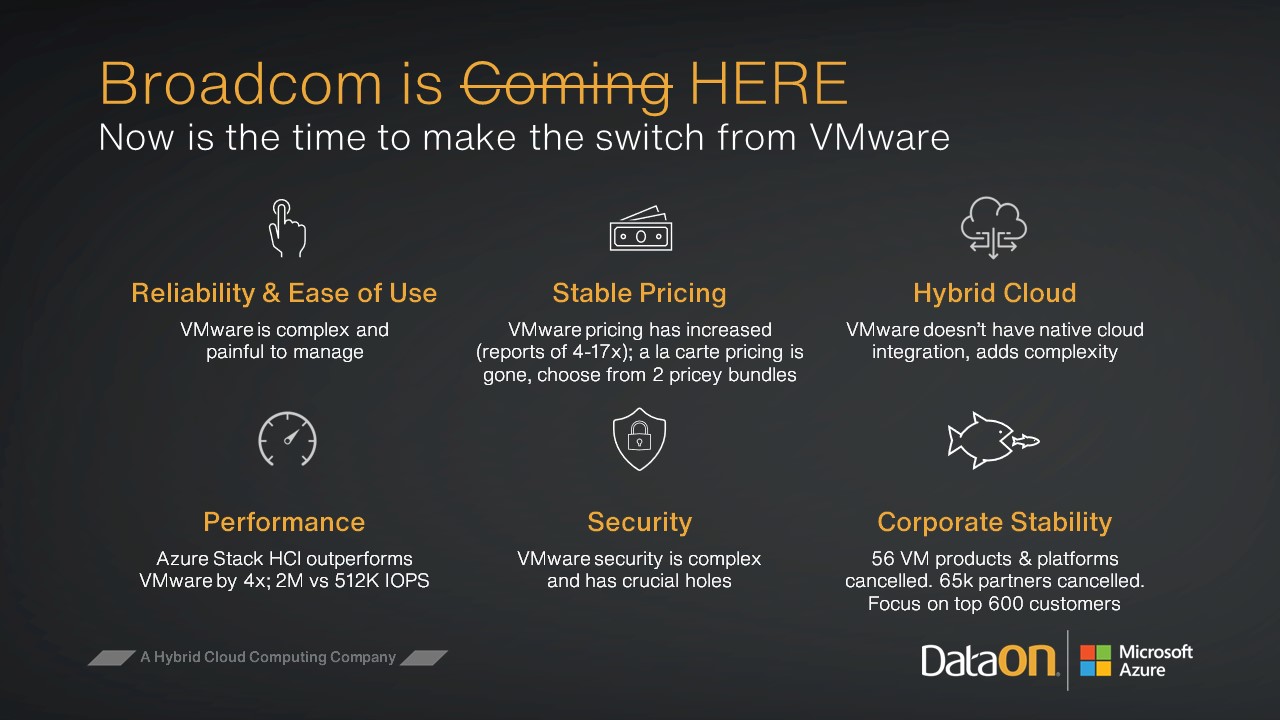Broadcom’s acquisition of VMware has been finalized. Officially, Broadcom is here and it’s not good. Some in the industry have even called it “an explosion with maximum disruption.” As of December 2023, Broadcom has laid off over 2,800 people and made significant changes to its product offerings, pricing, support, and channel programs. Forrester estimates that in 2024, 20% of VMware customers will begin the process of exiting VMware in favor of alternatives.
Let’s look at exactly what happened and how it will affect customers.
1. Broadcom has slashed its product portfolio and hiked prices.
According to The Stack, “Broadcom’s brutal assault on VMware’s product suite continues, with the company’s new owner this week confirming that it is sunsetting a massive 56 VMware products and platforms as standalone SKUs.” A’ la carte pricing is gone. Broadcom is now forcing customers to choose from only two pricey software bundles, VMware Cloud Foundation or VMware vSphere Foundation, and overpay for features many have no plans to use. Customers will also have to pay for “add-on services” for further functionality. To add insult to injury to its customers, VMware by Broadcom (as it’s now called), will no longer be available with a perpetual license, pushing customers toward a new subscription-only pricing model. These changes will hurt small-to-medium-sized businesses (SMBs) the most. In fact, according to ITAM Review, some customers have reported up to a 1200% increase in pricing.
2. Sales and support have been severely disrupted.
Just a few weeks ago, Michael Leonard, a former Senior Product Marketing Manager at VMware said, “People can’t get pricing, they can’t get support, they can’t get renewals, they can’t activate licenses. I’ve never seen anything like this in 15 years of working in IT and 25 working for 8 vendors.” Broadcom also “nuked” all channel programs after sending a “termination notice” to 65,000 partners, including solution providers, distributors, vendors, and massive global systems integrators. Many of VMware’s top resellers, distributors, and MSP/CSPs are irate, because they’ve lost access to partner tools, the internal VMware channel support team, and SPIFs and can no longer deliver the same “pre-Broadcom” standards of sales and support to customers.
Considering most of VMware’s SMB sales happen in the channel, it’s 100% clear Broadcom is only interested in keeping their largest and most profitable customers. In fact, Broadcom has stated that its go-to-market strategy is to focus completely on the needs and priorities of its top 600 customers.
3. Security has been a problem at VMware well before the Broadcom acquisition and it could get worse.
Alarmingly, according to The Stack this January, “vCenter Server vulnerability went exploited for two years unnoticed. [The] attacks are ongoing. There are no workarounds that remove the vulnerability, which allows unauthenticated remote command execution on vulnerable systems…” With all the recent employee cuts, it’s likely VMware will struggle to quickly identify and resolve security vulnerabilities.
Yes, it’s a bleak picture. But if you’re a VMware customer and you’re looking to jump ship, the good news is you have a safe place to land. Microsoft Azure Stack HCI is a complete hybrid cloud solution that delivers industry-leading virtualization performance, robust on-premises management, security and the power of Azure cloud and Azure Arc at your fingertips.
Unlike VMware, with Microsoft’s flexible licensing, you’re not locked into expensive bundles, you only need to pay for the services and applications your organization needs. And as one of the largest companies in the world, you don’t need to worry about Microsoft being bought out or experiencing massive disruptions to its ecosystem.
Now that Broadcom is Here for VMware, let DataON help you make the transition from VMware to Microsoft.
